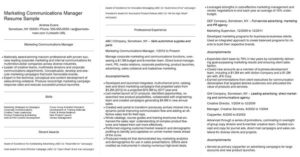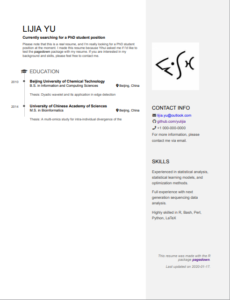A well-crafted resume is indispensable for forging a successful career path. Conversely, a poorly constructed one can impede progress and even halt advancement altogether. Resumes serve as the doorway to a promising future, but resume errors can significantly hinder career prospects.
Crafting a meticulous resume is far simpler than repeatedly applying to numerous companies and facing rejection each time. While creating a stellar resume requires time and focus, it’s much easier to inadvertently sabotage one.
Here are five common resume errors in which individuals ruin an otherwise excellent resume:
1. Including Unnecessary Personal Details

Recruiters typically require only essential personal information such as name, phone number, email address, and occasionally LinkedIn URL. Any additional details, such as caste, region, race, or religion, are not only irrelevant but also unprofessional. Political or religious affiliations should never find a place in a resume, as they hold no bearing on professional qualifications or suitability for a role.
2. Grammar and Formatting Errors

Grammatical mistakes and formatting blunders reflect poorly on an applicant’s attention to detail and professionalism. It’s essential to meticulously proofread the resume to ensure flawless grammar and coherent formatting. Avoid using shortcuts or emojis, as they undermine the seriousness of the document and create a negative impression. There are many online grammar-checking websites or else you may just ask for the help of your family or friends.
3. Excessive Length

Resumes should be concise and to the point, ideally limited to one or two pages. Lengthy resumes overwhelm recruiters and make it challenging to glean relevant information quickly. Avoid treating the resume like a comprehensive report or thesis; instead, focus on highlighting key achievements and qualifications concisely.
4. Poor Readability

Maintaining a professional appearance is crucial for a resume’s readability. Using standard font styles and sizes enhances clarity and ensures compatibility with applicant tracking systems (ATS). Conversely, employing unconventional fonts or excessive formatting makes the resume appear unprofessional and difficult to read.
5. Leaving Empty Sections

Leaving sections blank or unevenly spaced creates an impression of incompleteness and lack of attention to detail. It’s essential to fill all sections with relevant information and maintain consistent spacing throughout the document. Blank spaces signify a lack of substance or accomplishment, diminishing the applicant’s credibility.
In conclusion, avoiding these pitfalls is crucial for crafting an impressive resume and securing future career opportunities. Take the time to craft a polished and tailored resume utilizing online resources like cvDragon, and you’ll be well on your way to impressing potential employers and advancing your career.



0 Comments